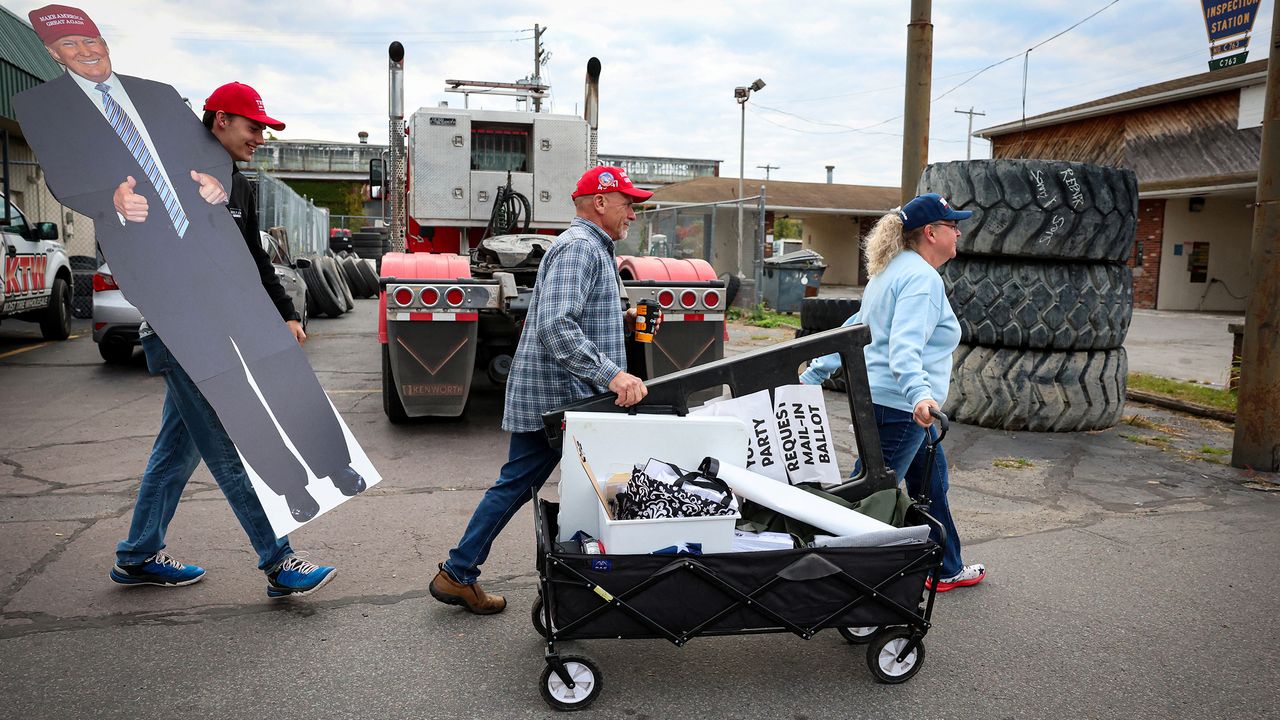It was a gray morning when I met Susanne Green, a Lackawanna County G.O.P. volunteer who helps coördinate the Election Integrity Task Force, in downtown Scranton. A native of Lackawanna, Green, who is sixty years old with golden-brown hair and an efficient air, worked for a time at a Planned Parenthood branch in Washington, D.C. “I grew up a Kennedy Democrat, my whole family was Kennedy Democrats, the whole valley was Kennedy Democrats,” she said. “The Democrat Party doesn’t seem to be Kennedy Democrats anymore. They’re different. They’ve changed. Our value system has not.” After retirement, she returned to rural Lackawanna, which she found was struggling. In 2016, she and a friend founded a food share, where locals could come for free groceries. “A lot of the neighbors—there’s some trailer parks that are nearby—they’re having such a hard time.” During the COVID-19 pandemic, she said, they fed about twelve hundred families every two weeks. “I saw a real need for resources in our rural community, which is still Lackawanna County, but we didn’t really get any,” she told me.
When Trump first came along, Green sensed that it was he, not any Democrat, who would best represent the interests of her community. “I think that Trump is for women’s reproductive rights,” she told me. How, I asked, did she square that view with the fact that Trump had appointed the judges who overturned the right to abortion? “The Supreme Court is not just one Justice, O.K.? It’s a group of nine, and they talk about things together. So, they found that Roe v. Wade should really be up to the states.”
We walked over to a pop-up tent, where a small group of Trump volunteers stood bundled against the fall chill, waiting to register voters or help people change their party affiliation. In recent weeks, Green has moved the tent to various locations throughout the county, including the local junk yard, which proved to be an especially target-rich environment for registering Trump supporters who haven’t voted in years, people whom the campaign refers to as low-propensity voters.
A seventy-year-old Black veteran named Dennis Frison stopped by the tent and tried on a Trump-themed hat. “It took me ten years to get a ten-per-cent service-connected disability,” he said. “And I look around, I see people speaking another language, who just came from somewhere—God knows where. I know it don’t sound nice, but it’s facts.” He remains torn between Harris and Trump.
Under the tent, Linda Bonczkiewicz, an organizer for Trump Force 47, the campaign’s effort to recruit volunteers to get out the vote, and JoAnne Mayer, who wore a red coat and black patent-leather boots, started talking to me about January 6th. Both had been at the Capitol that day. “Peaceful, loving, kind, right until the news media got there,” is how Bonczkiewicz described the day to me. Mayer whipped out her phone and scrolled through her camera roll to show me in one picture how close she had been to the wall of plastic police shields, and in another, pointed to a woman she said she thought was Ashli Babbitt, the rioter who was shot and killed as she tried to climb through a smashed window. The pair didn’t believe that the race between Harris and Trump was as close as polls indicate. Mayer showed me a graph from the prediction market Polymarket which gave Trump a fifty-seven-per-cent chance of winning the election. I asked them how they were feeling about Election Day. “If God’s involved, it’s gonna be perfect,” Bonczkiewicz said. “People, I don’t trust. People are evil. And they’re gonna find something.”
Earlier that morning, Bob Bolus, again wearing his bright-blue Trump-Jesus shirt, had appeared at a meeting of the county commissioners. He confronted Bill Gaughan about the way he had ordered Bolus’s removal from another public meeting, two weeks prior. “You ordered the sheriff to grab me by my shoulder—I’ve got injuries to my shoulder, five shoulder surgeries, and I’m under medical care right now,” Bolus said. “I want you to understand, you and I will be going around again.” When I met Gaughan for coffee later that afternoon, at a local Starbucks, he seemed unbothered, even though he had become the focus of ire of a vocal contingent of citizens. “Anyone who stands up and tells them the truth, then they completely go berserk,” he said. “They don’t want to hear the truth. And that’s not just here in Lackawanna, that’s everywhere. They don’t want to hear any answers because it doesn’t fit into their narrative; it doesn’t fit into President Trump’s narrative.”
Gaughan, who grew up in the Minooka neighborhood of Scranton and graduated from the University of Scranton, became a county commissioner only ten months ago. Prior to his election, he had served on the Scranton City Council, while also teaching American government to high schoolers. When he started his term in January, the county government owed $18.5 million in unpaid bills. The day before we met, Gaughan and his fellow Democratic commissioner, Matt McGloin—a former Penn State quarterback—had announced a thirty-three-per-cent property-tax increase, which generated an outcry. I asked Gaughan if he was worried that his blunt approach with the public could jeopardize his reëlection.

